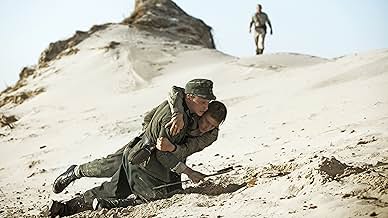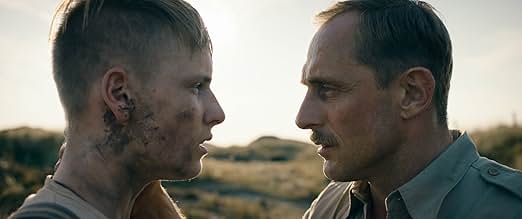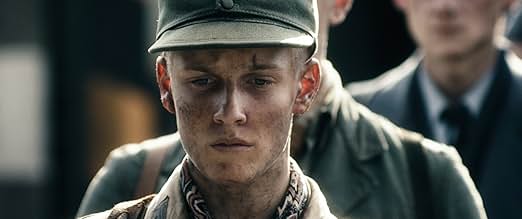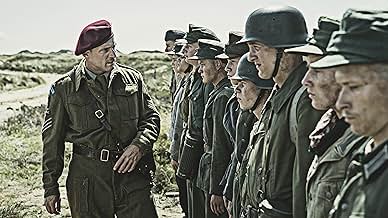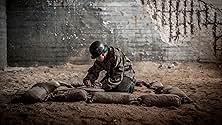Dans le Danemark qui a suivi la Seconde Guerre mondiale, un groupe de jeunes prisonniers de guerre allemands est contraint de nettoyer une plage contenant des milliers de mines terrestres so... Tout lireDans le Danemark qui a suivi la Seconde Guerre mondiale, un groupe de jeunes prisonniers de guerre allemands est contraint de nettoyer une plage contenant des milliers de mines terrestres sous la surveillance d'un sergent danois qui apprend lentement à appréhender leur situation.Dans le Danemark qui a suivi la Seconde Guerre mondiale, un groupe de jeunes prisonniers de guerre allemands est contraint de nettoyer une plage contenant des milliers de mines terrestres sous la surveillance d'un sergent danois qui apprend lentement à appréhender leur situation.
- Réalisation
- Scénario
- Casting principal
- Nommé pour 1 Oscar
- 33 victoires et 27 nominations au total
- Elisabeth, Karins Daughter
- (as Zoé Zandvliet)
- August Kluger
- (as Maximilian Beck)
Avis à la une
Anyway, the film was heartbreakingly amazing. The WWII stories I had seen those told from the perspectives of the Australian, Japanese, Korean, Russian to African and European to the American western sea, Hawaii. And this is a Danish story, sets in just after the end of the war where prisoners of the war were used to clean up the mess. In the opening the teen German POWs were trained to defuse the land mine explosives and then later the unit was handed over to the Danish sergeant Carl Rasmussen where they are all going to work in one of the west coast landmines that was used to defend the Scandinavia by the Nazi. That is the story told how it all ends in the remaining parts.
This was like another 'Kajaki', but not actually a war film. Using of the prisoners as the labourers is a violation, according to the Geneva rule. That's the point of the film, focused to reveal the inhume act. But it was not anything like 'The Railway Man' 'Unbroken' or the 'The Bridge on the River Kwai'. Watching a film about the brave soldiers inspires us and bring patriotism, but in this those teen kid screaming whenever something goes wrong really brings heartache. So not everybody feels comfortable with it, especially the family audience. But there were lots of edgy moments and you would never know what events follows.
"If they are old enough to go to war, they are old enough to clean up."
It was shot is the real location, and I think that part contributed to depicting the actual atmosphere where most of the POWs lost their arms and legs and some exploded into many pieces in the air. It was a simple narration, but the visuals talked itself more than anything else. All the actors were outstanding, especially those 4-5 German teens and of course the Danish sergeant Carl. I think the Carl's influence had more impact, after seeing the opening scene where he went outrage and beat up those German soldiers returning home.
There are a couple of small twists, but there are some scenes which are not easy to get over. Even though we know those were just fake, but that does not work once you totally into the story deeply. This is a different kind of emotional film, something you rarely experience. The director who is also the writer must be appreciated for handling it perfectly. Especially keeping the screenplay uncomplicated and between the two nations, where in the real event involves the British officials. I have never seen his other films, but this one will define him forth and the people are going to recognise him. So I hope he'll keep up doing such level films in the future.
I have never seen such film, I mean seen some where the kids were tortured, but this was very unique and totally a different perspective for that takes place in the backdrop of the WWII. Especially the Germans perspective is the very rare kind. So I'm kind of thinking if Germany picks 'Look Who's Back' for the Oscars, the contest between these two would bring two different moods. At this point I don't remember any Danish film I have seen so far in my life other than this one which I feel is the best Danish film ever. I mean, come on, who would do such film where your own nation, if not the whole nation, the one who represent was shown in the negative shade over the Nazi Germans. This is definitely one of the best films of the year. Highly recommended.
8/10
Couple of comments: this is a high-profile (more on that later) and expensive (for European standards) production that brings to the big screen a post WWI episode not well known by the public at large (in the movie's end titles, we learn that more than 2,000 German soldiers were involved in this enormous mining clearance project). The movie's underlying tension (namely, at any time one of those landmines may detonate when making a minor error) rarely lets up, keeping us at the edge of our seat. On top of that, there are several outright brutal scenes involving Sgt. Rasmussen's attitude towards the boy soldiers (it somehow reminded me of the first half hour of Kubrick's Full Metal Jacket). All that said, while one certainly may have empathy for the boy soldiers as a group, I found it difficult to have the same emotional investment for the individual boys, as frankly they all seemed interchangeable to me within the movie's context. But in the end, this is an eye-opening movie on many levels. Danish actor Roland Møller in the role of Sgt. Rasmussen is nothing short of extraordinary.
"Land of Mine" received immediate critical acclaim upon its release in 2015 and in fact was nominated for the 2016 Best Foreign Language Movie Oscar, yes, LAST year's Oscars. I have no idea why this movie is just now opening up in US theaters, but better late than never I suppose. The Saturday matinée screening where I saw this at in Ft. Myers was attended very nicely, much to my surprise. If you are interested in a slice of WW II history that you may not be familiar with, I urge you to check this out, be it in theater, or later on Amazon Instant Video on eventually on DVD/Blu-ray. "Land of Mine" is HIGHLY RECOMMENDED!
It is 1945 and the war is over, but the beautiful Danish coastline has two million deadly mines left buried in the sand by the Nazi occupation. Danish Sergeant Carl Rasmussen (Roland Møller) is assigned a squad of fourteen German prisoners of war who must clear a beach that contains 45,000 active mines. The Sergeant's treatment of the teenage boys is initially brutal: they live and work in terrible conditions, are practically starved and constantly reminded that everyone in Denmark hates them and nobody cares if they live or die. Their task is to crawl along the beach by hand, poking a stick in the sand to locate mines, then defuse them before they explode. Inevitably, many failed. With echoes of Stockholm syndrome, both captor and captives find glimpses of humanity in each other that leads to Rasmussen being suspected by his tormenting superiors of going soft on the Germans. He must walk the fine line between military obedience, personal hatred of Nazis, and his growing compassion and realisation that these are just boys who were conscripted into battle. His characterisation and its transition from hatred to acceptance frames the narrative of this high-tension drama.
Stunningly realistic cinematography with minute attention to detail amplifies the horror of this story. The acting is remarkable from a mostly unknown cast and Rasmussen's performance captures the very essence of moral conflict. The mine-clearing proceeds inch-by-agonising-inch, and the film's plot line inches forward at a similar pace. With camera at sand-level, we see close-up images of teenage warriors with beads of terror trickling down their faces as their sand-covered fingers slowly un-screw a detonator from a mine, knowing that an explosion will tear their body to pieces. These are some of the most heart-pulse racing moments you can experience through film. This is not entertainment nor is it for faint-hearted viewers; several scenes are horrific.
Most war films glorify battle or corner us into cheering one side or the other. This film presents an exquisite conundrum: was it morally acceptable for the Danish military to force German POWs to remove the deadly mines that the Nazi army left behind, knowing that most will die or be maimed? Or should this deadly work have been carried out by Danish soldiers? Was the inhumane treatment of teenage soldiers justifiable, regardless of the brutality of the Nazi occupation of Denmark? In the light of such questions, is this film one of justification or a confessional that seeks atonement? Land of Mine shines a bright light on what has hitherto been a dark secret of Danish history. It is a powerful and important story.
The film, written and directed by Martin Zandvliet, is an excellent motion picture, managing to bring to the screen a work with a new approach, although all the other war films ever made before. With an original script, the director succeeds to convey the bitterness brought by five years of Nazi occupation in Denmark. He also portrays the exploitation of children dragged into war. One of the great successes of Zandvliet's direction and script is to show the war cycles: the winners, the danes, start to adopt the brutal practices of the losers, the Germans. It was precisely for situations like this that the Second World War broke out. France and other winning countries of World War required repairs and imposed absurd sanctions to Germany.
The photography, by Camilla Hjelm, is to behold. And here, again, we have to highlight the director's work. The use of long shot captures the beautiful danish landscape, while more intimate moments allow us to monitor the interactions among those soldiers. Maintaining an intense pace, the tranquility and vastness of the beach are contrasted, at all times, with the danger that awaits them "under the sand", expression that names the film. The soundtrack is catchy and at times heartbreaking, fitting in the drama narrated in the film.
One of the elements that makes Land of Mine a memorable experience is the excellent performance of Roland Møller, playing the role of Sergeant Carl Rasmussen, protagonist of the story. Responsible to oversee the group of German soldiers, Carl struggle to separate his military duties from the hatred he feels for the old enemy. The actor delivered a complex character, moody, bitter and angry, but at the same time which has not lost humanity that exists within him. The rest of the cast was also well chosen and psychologically developed, in which the actors who play the soldiers have different personalities.
With a philosophical discussion about military conflicts as well as being very intense and beautiful, Under Sandet gives us a real view of the complexities of the Second World War and human behavior.
Originally posted in: https://vikingbyheart.blogspot.com.br
Le saviez-vous
- AnecdotesThe actors were trained in mine clearance 'anno 1945' at the Military Training Compound 'Oksbøl.' During training, they found a 'live' mine that had been there for 70+ years--and it was in fine working condition. The mine was removed and disarmed by the Danish de-mining experts.
- GaffesThey are mainly clearing Anti-Tank mines, and indeed mention this in the dialogue. However, Anti-Tank mines are designed to not be triggered by a person's weight, so troops can cross them without them going off--so that they are still in place and active when armored vehicles in support of the troops ultimately cross the same path as the troops. Anti-Tank mines need several tons of pressure to activate. In the film, they are treated like eggshells.
- Citations
Lt. Ebbe Jensen: If they are old enough to go to war, they are old enough to clean up.
- ConnexionsFeatured in La noche de...: La noche de... Bajo la arena (2021)
Meilleurs choix
- How long is Land of Mine?Alimenté par Alexa
Détails
- Date de sortie
- Pays d’origine
- Sites officiels
- Langues
- Aussi connu sous le nom de
- Land of Mine
- Lieux de tournage
- Sociétés de production
- Voir plus de crédits d'entreprise sur IMDbPro
Box-office
- Budget
- 35 500 000 DKK (estimé)
- Montant brut aux États-Unis et au Canada
- 435 266 $US
- Montant brut mondial
- 3 169 553 $US
Contribuer à cette page








